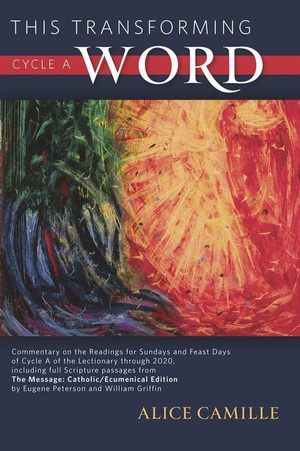This Transforming Word: Cycle ACommentary on the Readings for Sunday and Feast Days of Cycle A on the Lectionary, including full Scripture passages from The Message: Catholic/Ecumenical Edition
Each Sunday and feast of the church year, the transforming word of God echoes its challenge. We hear it through stories of patriarchs and matriarchs who dare to embark in new directions trailing an untested Divinity. It shouts in the oracles of wild prophets madly in love with an unlikely future. It sings in psalms and canticles. It beckons in Lady Wisdom. It invites us to come and see in gospels, and to repent and believe in letters of instruction. Creation testifies to it. Apocalypse mystically reveals it. And all the while this longing word is calling through the centuries, eternity waits in hushed silence for the freely rendered human response. Yours. Mine. Everybody's.
Buy it in these formats:
Review
Alice Camille has written THE book for breaking open the Sunday readings- for homilists, teachers, RCIA groups, small communities, youth ministry, and anyone else who wants to let the weekly readings enter deeply into their hearts. This is an amazing resource. All the readings are provided from The Message (a new translation of the Bible into contemporary English) along with a brilliant commentary on each. She even provides carefully considered weekly reflection questions. All in all, this is a terrific resource. And to top it off, it's bound in such a way that it lays open in your hands like a Lectionary. Really, this is the best book I have seen on the Sunday readings in many years. Great Job! Bill Huebsch
Book Excerpt
IMMACULATE CONCEPTION/No and Yes
FIRST READING: GENESIS 3:9–15, 20
The story of humanity starts with No. We see this in two-year-olds, who discover their distinction from their parents as they exercise that wonderful declaration of their autonomy at the top of their lungs: "No!" It appears instinctive in human nature to define our will over-and-against the will of the Powers That Be.
While most of us eventually learn how to pronounce our refusals to authority without piercing eardrums, not all of us master the opposite skill: aligning ourselves with authority in a constructive way. Such folks remain conflicted at a primary level and become sources of conflict everywhere they go: in school and on the playground, in their marriages and toward their employers. They have problems with government of any kind as well as the perceived tyranny of organized religion. If saying No is an important early lesson to learn for the sake of autonomy, learning to say Yes is equally vital for the sake of the common good.
What is my attitude toward authority? How do I discern when Yes is appropriate, and when it’s time to say No with integrity?
